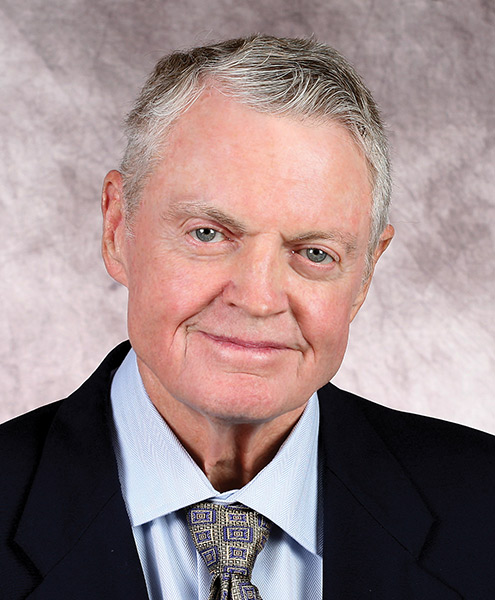
Tom Osborne
TeamMates Mentoring Program Co-founder,
Former Congressman,
Athletic Director and Football Coach
The words were inscribed on Memorial Stadium's northwest corner some 14 years before he was born; "Courage; Generosity; Fairness; Honor; In these are the true awards of manly sports." How fitting then, that the field inside that historic stadium is now called Tom Osborne Field in honor of a man, who throughout his professional career, relied on guiding principles based on more than winning.
Tom Osborne excelled in every aspect of his professional career, first as an assistant football coach, then for 25 seasons as one of the most successful football coaches in college football history. Following his retirement, Osborne served his home state for six years in the U.S. House of Representatives, before returning to lead Nebraska Athletics in the athletic director role for five years from 2007 to 2012. In each of these roles, he consistently kept the focus on service, as proven by the TeamMates mentoring program that Tom and his wife, Nancy, founded in 1991.
Osborne is best known for his legendary coaching career on the Husker sideline. In 25 seasons with Osborne at the helm, the Huskers mounted a 255-49-3 record - the sixth-most wins in major college history. Osborne's .836 winning percentage ranked fifth all-time. His career came to a close with a 42-17 win over No. 3 Tennessee in the 1998 Orange Bowl, when he became the first coach in college football history to retire as a reigning national champion. Following his career, he became one of just four coaches in history to have the mandatory three-year waiting period waived for induction into the National Football Foundation College Hall of Fame in December of 1998.
Osborne's 1994 and 1995 teams allowed Nebraska to become just the second school in history to post back-to-back perfect national championship seasons (Oklahoma 1955-56). Nebraska put together the best five-year run in college football history from 1993 to 1997, going 60-3 with five straight 11-win seasons. Osborne led NU to 13 conference crowns, including six of his last seven seasons on the sideline. All 25 of his Husker teams won at least nine games and went to a bowl, while 15 won 10-or-more games.
In the classroom, the NU football program totaled 65 CoSIDA Academic All-America awards in Osborne's 25 years. In fact, he accumulated more football academic All-Americans in his 25 years as coach than any other football program in the nation has produced in its history.
Following his retirement from coaching, Osborne turned his attention to serving the state in the U.S. House of Representatives. A Hastings, Neb. native, Osborne served the state's 3rd congressional district for three terms in Washington, D.C. from 2000 to 2006.
Osborne returned to the University as a senior lecturer at Nebraska in the College of Business Administration, teaching leadership and business ethics, in the fall of 2007, before being asked by Chancellor Harvey Perlman to return to Nebraska as athletic director in October of 2007. Despite being at the helm of the Athletic Department for a relatively short time, Osborne made historic decisions that will impact Nebraska athletics well into the future.
In June of 2010, Osborne was a key figure in the decision for Nebraska to join the Big Ten Conference beginning in the 2011-12 academic year. Nebraska's move to the Big Ten will continue to add University-wide academic opportunities, while providing financial stability for the athletic department for years to come. Just a few months later, Osborne announced an aggressive expansion plan for the east side of Memorial Stadium that will increase attendance past 90,000 for the first time, while continuing Nebraska's NCAA record-setting sellout streak. The expansion, now complete, includes athletic and academic research components.
Osborne also played a leading role in several other building projects that put Nebraska's facilities at the very top in collegiate athletics. In the spring of 2010, the city of Lincoln also received voter approval to begin construction on Pinnacle Bank Arena, which now serves as the new competitive home for both Nebraska men's and women's basketball programs as of the 2013-14 season. The basketball programs, the wrestling program and many of NU's other sports also have benefitted from the new Hendricks Training Complex at the Bob Devaney Sports Center. The facility, which opened in October of 2011, includes practice and team areas, and greatly expanded athletic medicine and strength training areas. The Nebraska baseball and softball programs also received a new indoor practice facility that opened in the fall of 2001 at Haymarket Park.
The first step in Osborne's aggressive building plan for Nebraska's facilities began in the summer of 2010, as the Huskers broke ground on the Student Life Complex on the west side of Memorial Stadium. The Student Life Complex, which opened in the fall of 2010, directly benefits every Husker student-athlete with expanded academic resources.
Osborne retired as athletic director on Jan. 2, 2013. Following a six-month role as Athletic Director Emeritus, Osborne plans to devote even more time to possibly his greatest passion, the TeamMates Mentoring Program. The program provides encouragement to school-aged youth to help them graduate from high school and pursue a post-secondary education. The program now serves nearly 7,000 youth with mentors with a goal to serve 10,000 youth by 2015.
Osborne is also continuing to play a leading role in college football. In October, Osborne was one of 13 individuals selected as members of the first College Football Playoff Committee. The group will be charged with selecting the four teams that will participate in the new College Football Playoff which will begin following the 2014 season.
Join Us!
Feeling that Engler fire? Ready to start this journey?